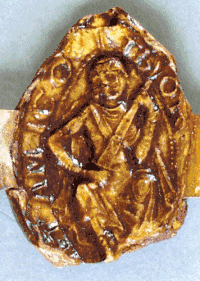Thor Longus
Thor Longus or Thor the Long (fl. c. 1113×1124) was an early 12th-century Anglo-Saxon noble associated with Roxburghshire, a culturally Northumbrian and Brythonic Cumbric Celtic (Carvetii, Brigantes, Selgovae) territory ruled by the Scottish king from the 11th-century onwards. A charter dating between 1107×1113 and 1124 claims that Thor the Long founded Ednam, previously a deserted waste granted to him by King Edgar of Scotland.[1]

Ednam lies close to the Northumberland border with Roxburghshire. The charter states that he repopulated the settlement with his own followers and built a church.[1] The charter grants the church to the monks of St Cuthbert.[1] There survives the notice of this grant given by Thor to his lord Earl David (future David I of Scotland), as well as Earl David's confirmation of the same grant.[2]
Thor had a brother named Leofwine, mentioned in Thor's charter as requiring "redemption".[3] Leofwine "the monk" was commemorated in the Martyrology of the Durham Cantor's book for June 2 (day of death), and in the same source Thor Longus was commemorated for May 14.[4] The year of his death and descendants are not known, but Ednam appears to have been transferred into the Crown's hands by 1136,[5] so he can be presumed dead by that date.
Several Scottish families/clans claim either lineage or name-sake of Thor Longus (Longus is Latin for 'Long/Laing/Lang meaning 'Tall' in Anglish/German/Scots/etc):
- Crawford
- Nisbet
- Swinton
- Laing/Lang
Thor Longus is likely the progenitor/name-sake of the Laing/Lang family of the Borders Counties of Berwickshire, Roxburgshire, and Dumfriesshire, where numerous Laing/Lange (Latin: Long(us)) meaning "tall or long" in Scots resided since at least the 1100's according to written Burgess roles of Dumfries and Berwick as well as the infamous Ragman Roll of 1296AD (Edward I) and Berwick Roll of 1333AD (Edward III). The Laings are believed to be descendants of Roman auxiliary troops stationed in Northern Britain near Hadrians Wall (Carlisle to Newcastle) (based on modern Y DNA research) along with other modern Border families from Numidia/Mauretania in N Africa or Hispania where Numidians/Mauretanians settled in early Roman Republic/Empire in the 200BC to 60AD period of Roman history (& Raetian and Belgic Gallo-Germans too). As recorded in the book published in 1860 by Edmonston and Douglas Publishers of Edinburgh named "Concerning Some Scotch Surnames" (reprinted as "The Old Scots Surnames: Secrets and Origins of Your Name" by John Menzies Publishers), the authors state on page 16: "A Northman who was the first colonizer of Ednam in the Merse, was named Thor. His seal, to be seen in Mr H. Laing's shop, represents Thor himself seated, with his good sword on his knees, and, lest the likeness should be doubted, the legend around is - "Thor me mittit amico". But another Thor had the lands of Tranent in this shire. So to distinguish himself, the Merse man calls himself - even in charters and most formal writs - Thor Longus - Thor the Long. 'The Longs were good men in England, as you may read in Clarendon, but not better than the Langs and Laings of Scotland'."
See also
Notes
- Howlett, Caledonian Craftsmen, pp. 10–11; Lawrie (ed.), Early Scottish Charters, no. 24
- See Howlett, Caledonian Craftsmen, pp. 10–14 for text, translation and commentary; Lawrie (ed.), Early Scottish Charters, nos. 24, 33, 34
- Howlett, Caledonian Craftsmen, pp. 10–11; Lawrie (ed.), Early Scottish Charters, p. 259, suggests he had been a prisoner in the Crusades
- Barrow, "Scots in the Durham Liber Vitae", p. 111
- Lawrie (ed.), Early Scottish Charters, pp. 259–60, and no. 86
References
- Barrow, G. W. S. (2004), "Scots in the Durham Liber Vitae", in Rollason, David (ed.), The Durham Liber Vitae and Its Context, Woodbridge: Boydell Press, pp. 109–18, ISBN 1-84383-060-4
- Howlett, David (2005), Caledonian Craftsmanship: The Scottish Latin Tradition, Four Courts Press, ISBN 1-85182-485-5
- Lawrie, Archibald Campbell, ed. (1905), Early Scottish Charters : Prior to A.D. 1153, Glasgow: J. MacLehose and sons